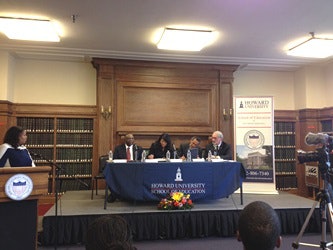
“Despite all of this diversity in the public school student population, there’s a yawning diversity gap between the nation’s students and the school personnel who serve them,” said Dr. Leslie T. Fenwick, HUSOE dean. Less than 5 percent of the nation’s 14,000 school districts are led by superintendents of color, Fenwick said.
HUSOE will be home to the Urban Superintendents Academy, whose first cohort is slated to arrive on Howard’s campus this summer. Representatives from HUSOE, the American Association of School Administrators (AASA) and the co-directors of the academy signed a memorandum of agreement today at Howard’s Founders Library.
While one of the academy’s foci will be to help aspiring superintendents acquire a job, proponents of the academy said that simply preparing prospective superintendents for the job search and interview process is not enough. The academy is intended to help prospective superintendents prepare for the many and varied issues specific to urban communities that come up after they have the job. So far, 36 professionals have signed up for the academy. HUSOE will be accepting applications until May 11.
“This is not a generic program,” said academy co-director Dr. Joseph A. Hairston. “Our intent is to talk about the unspoken experiences of urban superintendents.” Hairston said that superintendents contend with complex political and economic pressures on a nearly daily basis but are afforded limited opportunities to learn how to navigate them. The academy is intended to help future superintendents prepare for such situations.
Another goal of the academy is to help prospective superintendents learn how to gain the trust of local communities as well as communicate effectively with local boards. To prepare prospective superintendents for the complexities of the job, the academy will provide cohorts with mentors who are sitting superintendents.
“These leaders must be equipped to work with the dramatic and active demographic shifts and upset the evolving political, economic, and cultural realities that impede administrators from achieving their potential,” said Dr. Dawn Williams Salters, chair of the department of educational leadership and policy studies at HUSOE.
As an extreme example of both how superintendents are entwined within their local communities and the sorts of unexpected social and political problems that affect their work, Gregory Thornton, CEO of the Baltimore City Public Schools, was supposed to be present at the MOU ceremony. Baltimore public schools were closed Tuesday as riots continue to engulf the city, and Thornton was unable to attend the signing.
Although the academy will be national in its scope, it was conceptualized and will be led by former superintendents from the greater Washington, D.C., area. Hairston, current HUSOE assistant professor and USA co-director, was the superintendent of Baltimore County Public Schools until 2012. Hairston’s co-director, Dr. Morton Sherman, is currently the associate executive director at AASA and was the superintendent of the Alexandria City Public Schools from 2008 to 2013.
Staff writer Catherine Morris can be reached at [email protected].



















